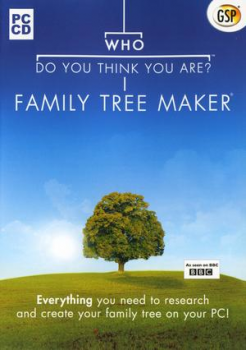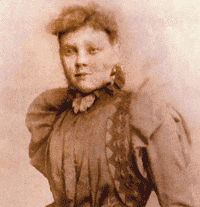TV Tears: Learning Through Emotion in Popular Factual Entertainment
Lisa W. Kelly / University of Glasgow

As a television academic and fan, I have tended to be drawn to the world of fiction, consuming and analysing as many quality dramas and well-scripted sitcoms as possible. However, recently I have been surprised to find myself watching more and more popular factual entertainment, a genre that has previously failed to ignite my sustained excitement. While it may not be difficult to understand the appeal of The Apprentice (with its fascinating insight into the competitive nature of business) or America’s Next Top Model (a wonderful guilty pleasure), my viewing tastes have expanded to include amongst others, Who Do You Think You Are?, the BBC’s genealogy series in which celebrities trace their family history, and The Secret Millionaire, a Channel 4 show that follows self-made millionaires as they volunteer in deprived areas of the country before donating money to those that they believe to be most in need.1 Perhaps my tastes are simply maturing (along with my age), thus explaining my new found interest in history and class-related programmes. But I suspect that it is has more to do with the way these programmes are presented or rather the fact that they tend to elicit an emotional response from me that even the most gripping drama does not. In short, they reduce me to tears.
These tears are not just restricted to the viewers at home but also flow on screen as well, as celebrities break down on hearing the fates of their ancestors or deserving participants express their shock at receiving a cheque from someone they thought was a kind-hearted volunteer. This emphasis on emotion can be problematic however, as it often overshadows the more important issues raised within such programming. For example, I recently screened an episode of Who Do You Think You Are? to a group of students at the University of Glasgow, only to be surprised by their cynical response. Featuring the broadcaster Jeremy Paxman, who is known for his tough and abrasive interviewing style on the BBC current affairs programme Newsnight, I chose this particular episode because it follows the resolutely English and middle-class Paxman on his journey to Glasgow where he discovers information about the poverty stricken lifestyle of his maternal great-grandmother in the city’s east end. While my intention had been to discuss the use of location and the issues of class and gender that were raised in the programme, the majority of students chose to focus on the moment when the camera zooms in on Paxman as he begins to cry on learning of his great-grandmother’s tragic circumstances. For the students, this was seen as a manipulative act by the producers of the show and resulted in them being sceptical about the other information presented within the episode.

This is unfortunate because for me Who Do You Think You Are? is that rare example of popular factual entertainment featuring celebrities that nevertheless teaches us something valuable about social history, family ancestry and, of course, human emotion. Viewing it within the wider media landscape however, I realised that the display of emotion, and specifically tears, is becoming increasingly common in programming featuring real people.2 While tears and tantrums have become a staple of reality TV such as Big Brother and I’m a Celebrity . . . Get Me Out Of Here!, even talent shows such as X Factor now require contestants to possess some sort of ‘sob story’ in addition to singing ability in order to go further in the competition. With emotion being so commonplace on television, it appeared to be something of a turn off for the young students in my seminar group.
And yet, it is precisely this combination of learning and emotion that the BBC in particular appears to be aiming for with its factual entertainment output. Discussing BBC2 under the control of Jane Root from 1999 to 2004, Raymond Boyle notes the way in which the brand identity of the channel ‘was to be built around programmes that were entertaining but also had an educational dimension, a strategy that began to reformulate what public service broadcasting would look like in a digital age.’3 According to Root herself, the notion of education has changed over the years in relation to television:
“These days television isn’t a very good place for getting your facts, because you can get facts anyway. Television is a medium that is primarily good at communicating emotion, and what’s interesting is to link emotion to ideas. My favourite programmes on BBC2 are always emotion with ideas.”4
On relating this to Who Do You Think You Are?, there is certainly a wealth of ideas and information to be garnered from each episode on historical events and issues, but the programme is essentially presented as a ‘personal’ journey for the celebrity and thus places an emphasis on the display of emotion. Nevertheless, I would suggest that the series does offer a further ‘learning’ aspect in that viewers are encouraged to become actively involved in tracing their own family history by either visiting the BBC’s Family History website or by purchasing the series DVD or Family Tree Maker software. This effective use of other platforms demonstrates the way in which, in the digital age, public service broadcasting need not only be confined to a television programme but can also operate via a variety of formats.

In contrast, Channel 4’s attempt to address current (rather than historical) issues in The Secret Millionaire is more problematic. In this instance, I believe it is easier to be cynical about the series because as each person relates their troubled background to the camera or is shown carrying out the good work they do for the community, the audience is aware that they will undoubtedly be rewarded by the end of the episode (at times a ‘ker-ching’ wouldn’t seem out of place on the soundtrack). Yet, I personally never fail to be moved to tears in those final moments when the deserving participants are presented with a cheque. The problem with The Secret Millionaire is that although it admirably displays a side of society that is rarely shown on television (due to the medium’s obsession with apsirational lifestyles), it is difficult for the programme to have a wider impact. The show’s website encourages people to ‘get volunteering’ but this merely pays lip service to the problem of poverty and underfunded services in today’s society. The rest of the website focuses exclusively on the lives of the millionaires involved rather than those living on the poverty line. With regards to the programme itself, the audience undoubtedly learns something about how difficult people’s lives can be but in the end they are asked to identify with the millionaire philanthropist and their sudden appreciation for the comfortable lifestyle they lead as the camera follows them on their journey home. It is perhaps no surprise then that when the follow-up programme The Secret Millionaire Changed My Life was broadcast, the moral of the story was that the experience had changed the lives of the eponymous participants of the series just as much, if not more, than those of the unwitting recipients.
[youtube]http://uk.youtube.com/watch?v=aNyGXgAle-Q[/youtube]
It is important, therefore, to ask who these programmes are aimed at and who our tears are being shed for. While Who Do You Think You Are? teaches us that we are not that far removed from one another and that our own personal ancestry is inextricably bound up with social history, I would suggest that The Secret Millionaire allows a middle-class audience to voyeuristically experience the lives of the unsung heroes in society (those working in care homes, looking after the disabled, or fostering troubled teenagers) through the eyes of the privileged few. Viewed in this context, the tears generated by the latter become questionable.
Image Credits:
1. Who Do You Think You Are? Family Tree Maker Software
2. Jeremy Paxman Crying on Who Do You Think You Are?
3. Paxman’s Great Greandmother, Mary McKay
4. Front Page Image
Please feel free to comment.
- Who Do You Think You Are? is a format that has already been sold to Canada and Australia, and more recently to the American television network NBC. The U.S. version of The Secret Millionaire is scheduled to air on Fox in December 2008. [↩]
- This includes programmes featuring ‘ordinary’ people on television as Frances Bonner describes them or celebrities eschewing their public personas to appear as ‘themselves’ on screen. See Frances Bonner, Ordinary Television: Analyzing Popular TV (London: Sage, 2003). [↩]
- Raymond Boyle, ‘From Troubleshooter to The Apprentice: the changing face of business on British television’ in Media, Culture & Society (Vol. 30, Issue 3, 2008) p. 420. [↩]
- Simon Kirk, Interview with Jane Root (2004) URL (consulted October 2008): http://www.sussex.ac.uk/Units/alumni/notable_alumni/interviews/Root_interview.html. [↩]
Your ending comments made me think of the sort of faux citizenship that shows like “Extreme Makeover: Home Edition” provide for viewers at home (watching the show equates to support of it, which means that by watching viewers are helping others). I think your questioning of who we are crying for and what kind of vicarious living we all do through television is important.
Hi Lisa,
If television has a role as public communicator: that is, as a medium it should speak to, as well as of, its audience, then tears, emotion are going to be important. The problem however is that tears are ambiguous referring as much to our own idiosyncratic make-up, to the context of viewing, to temporary states of mind as much as the events or people which seemingly trigger them. Tears are not particularly useful but they are somehow satisfying. Your focus on crying I think is really about what can television actually change about people, what can it teach people that has any kind of longevity? Like you I have an ambivalent response to these programmes because I think they can often reveal history and political questions in a compelling way, on the other hand, the repetition of the same format week after week (where we begin to wait for the ‘money shot’ of tears) makes this kind of programme feel more and more manipulative of its audience and its subjects. I think an early episode of WDYTYA in which the ex-newsreader Moira Stewart refuses to be seen crying on camera (she leaves the room and shuts the door behind her) is interesting here and asks all sorts of questions about her persona/performance (- for US readers Stewart was the first black female newsreader on the BBC and she is associated with a particular kind of gravitas and elegance.) That’s also why the Paxman example is so interesting because it caused such a furore when he cried, while in contrast, the discussion around Patsy Kensit’s more effusive crying in her episode was treated as somehow inevitable and trivialised, in part because she might be understood to be almost the polar opposite in terms of class and status to Paxman – even taking into account the obvious gender distinction in relation to the likelihood of crying for or on camera.
– anyway, great column and plenty of food for thought!
Thanks for the comments Laura and Karen. I don’t think EM:HE has been broadcast here in Britain Laura, so thank you for bringing it to my attention as it sounds very interesting. It seems to have moved on from formats such as Changing Rooms or Trading Spaces to provide a ‘tragic backstory’ element, which was not the case with the earlier shows. This suggests a deliberate shift within factual television, as the moment of ‘transformation’ has to be filled with emotion rather than simply showing contestants throwing a tantrum because they are not happy with the outcome. I also agree with the notion that we, as viewers, have to question our own motives in relation to watching these types of programmes and this is something I have considered in relation to comedy. Sitcoms such as The Office or The Comeback (which highlight the production techniques and performance style of reality TV) often make for uncomfortable viewing, as there is a suggestion that the viewer is somehow complicit in the humiliation process that can occur within reality programming. This can lead to viewers questioning their role in the production of humour and I think this is something that should also be considered in relation to emotional responses.
I think you’re correct Karen when you say that what I’m really getting at is whether these types of TV programmes can teach people things that have any kind of longevity. Jamie Oliver’s recent series Jamie’s Ministry of Food springs to mind here, as he tries to spearhead a campaign to teach people how to cook healthy meals. The programme received a lot of criticism in the press, some of which may have been justified (particularly in relation to class and gender), but what is interesting is that it also has an internet presence in which people are encouraged to ‘pass on’ recipes that they have learned to their friends and family. I think that by using the internet and other forms of new media, these shows may be in a better position to produce real change, although it remains to be seen whether Oliver’s campaign will succeed of course.